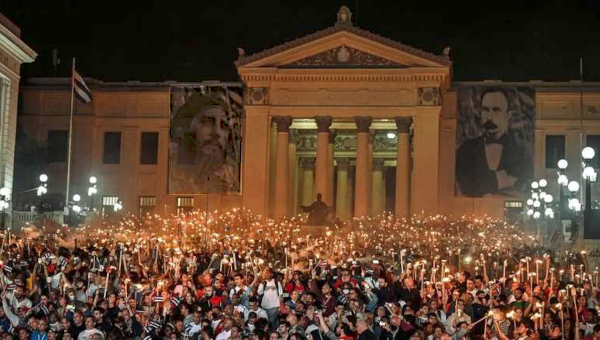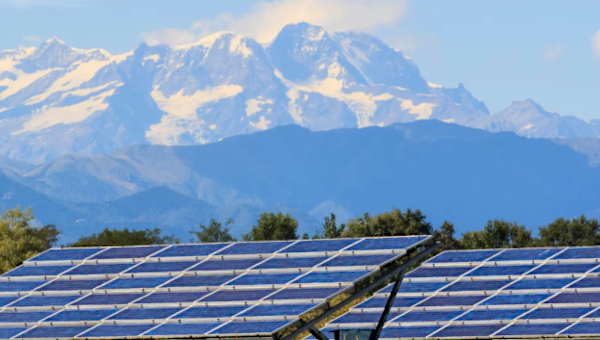‘To Have and To Be’: Building a Socialist-Feminist Economy in Venezuela
An interview with Lidice Navas
A long-time revolutionary activist, Lidice Navas is an important socialist-feminist leader within the PSUV and a candidate for the Latin American parliament, among her many other responsibilities. We met her at the Women’s Development Bank in Caracas on June 18, 2010 to talk about her vision of socialism, the accomplishments of the Bolivarian process so far, and what remains to be done.
What is your political history?
I am a candidate for the PSUV (United Socialist Party of Venezuela) in Caracas. I am also a member of the Political Bureau of the Region of Caracas and a candidate for the Latin American parliament. I also have some responsibilities in the Women’s Development Bank (Banco de Desarrollo de la Mujer, BanMujer) and am also active as a coordinator in the parroquia [parish] El Valle, where we are trying to construct socialism from the level of the community.

Lidice Navas in Caracas, Venezuela, June 18, 2010.
I have been a revolutionary activist for a long time. In the 1960s, I was a militant of the revolutionary movement in Venezuela. I was militant and founder of the Bandera Roja guerrilla movement in 1976, and when that divided I joined the Bandera Roja Marxista-Leninista. I was active in that organization until it, too, disappeared. These were difficult years. I was imprisoned many times and subject to political persecution. In the 1980s, for example, I was part of a simulated execution.
I sought exile in El Salvador, where I went with my husband, and we were militants with the FMLN revolutionary guerrilla movement. I lost both my husband and my eldest son in that struggle. I was part of the Truth Commission in El Salvador in 1992, and trained human rights workers until my return to Venezuela in 1995.
It was a new phase in the struggle when I returned. I first met Hugo [Chávez] in 1994 and worked on his electoral campaign in 1998.
What are the main objectives of the Women’s Development Bank?
BanMujer aims to fundamentally transform the lives of women, particularly women who do not have access to economic resources. One does not achieve this transformation only by giving credit. It requires social and productive processes as well as political formation and organization. Access to credit may be what initially attracts women to participate in the programs, but our aim is to build collective organizations that help women transform their lives so that they become self-governing protagonists. The promoters from BanMujer help to accompany and facilitate this political process. Since its founding, BanMujer has helped more than 400,000 women transform their lives. These women have formed cooperatives, production brigades, and organizations of the social economy, which are important in the transition toward a socialist economy. BanMujer has acted as a catalyst in this larger process.
What have been the challenges and the accomplishments for women in the Bolivarian process?
The biggest challenge has been to break the historical relationships of dependency, discrimination and exclusion. I am referring particularly to problems created by poverty. Previously poor people did not have access to credit from private banks. This has been one of our great accomplishments, which has inspired women to create new forms of production based upon what they already know, non-capitalist production that advance us toward a new form of economy, the socialist or solidarity economy.
For the first three years we granted credit to individuals. But now based upon what we have learned, we are emphasizing the importance of organization. This also implies that we form new relationships with the bosses. We have created the Red Popular de Usuarias de BanMujer (the Popular Network of Users of BanMujer) in which women help each other to build their self-confidence to form new kinds of societies. At BanMujer, we do not discriminate against women for their age or because they do not know how to read and write. It doesn’t matter if a woman is in her fifties, she can still be a productive member of society. Women who have participated in the network have also gone on to participate in all of the missions and programs that are offered. Many women are learning to read and write, and to even study at university.
I am also in charge of participatory research projects in BanMujer which aim to evaluate the impact of our programs. We do this on the basis of a “diálogo de saberes” (exchange of knowledge) which evaluates the strengths and the weaknesses of our financial programs and other programs.
In this moment one of my main challenges is to strengthen the cooperatives. The process of trying to transform cooperatives into organizations of the solidarity economy involves a steep learning curve for the participants.
What are the tensions that emerge when trying to articulate the forces from above and the forces from below?
We cannot forget that we are working in a context marked by over 500 years of colonialism, where the majority of people have been excluded. Colonialism broke the traditions of solidarity that were present in indigenous communities before the Spanish colonizers arrived. It also broke the harmonious relationship between humans and nature and among humans themselves, and imposed a new culture based upon exclusion, with exploiters and the exploited. In these feudal-like conditions, capitalism was born. And of course, this history weighs heavily on the present and makes it difficult to break with this system to advance in the construction of socialism. It weighs heavily on all aspects of life.
There are still people in the party [the PSUV] who ask themselves, what does it mean to behave like a socialist? What is my vision of socialism? This debate permeates all of our actions at the level of the institutions and the relationships with the community. It also affects the communities, something which is reflected in the difficulty we have in rupturing with the old politics of representation. It is one thing to be a spokesperson and another to be a representative. How should I act within my community when we are discussing a proposal, as an individual who states my opinion or should I go along with the collective, majority decision? It is very complicated.
In the relations of production within the women’s cooperatives, for example, there is no boss so the women have to learn how to divide the work. Their situation is distinct from workers in a capitalist enterprise where there is a boss who tells everyone what to do. The women themselves have to decide how to use resources and share the profits. This can be a shock.
In other areas as well, we want a rupture in order to advance in the deepening of popular power. In order to change the behavior of the parliamentarians, which laws to propose and discuss, which laws we need. We need to have a transformation in this area as well to keep pushing forward the project to empower the comunas (the community councils). These councils should assume the initiative; it should come from the people. The people should be the legislators and the deputies become the spokespeople who are accompanying the people. When we advance in this process we also advance in the weakening of the bourgeois constitution.
Right now we have a bourgeois parliament that makes evident the separation between the legislators and the people; there are those who make the laws and others execute these laws, separation between those who think and those who do. This is a big contradiction. There are many [in the parliament] who resist this transformation. On the other hand, the people are not quite sure yet what it means to be a legislator. This is a process that we have to develop.
There are contradictions between the individual and the collective, the state of being and the state of having. In capitalism it is all about “tener” (to have); it is what you have that makes you important. In socialism it is all about “ser” (to be); it is because of what you do that makes you important. This problem of “to have” is something which also causes corruption, because the impulse is still to accumulate, to have more than the other, to have more privileges, more space.
We also have to make a distinction between personal property and the means of production. The right wing likes to say that Chávez is going to steal peoples’ houses, their cars, their little businesses. We are only talking about moving against the private property over the means of production. The claims being made by the right-wing are ridiculous. If the government is creating all of these social programs to make it possible for you to have your house, your car, why would it take them away? I return to the example of the cooperatives. The idea is to collectivize the means of production where the relationships of production are based on cooperation and solidarity rather than exploitation.
We know that it is going to take a long time to overcome these contradictions. It is a long process, but it is also a very rich process. It is based not only in the vision of Simón Bolívar, but Simón Rodríguez (the teacher of Simón Bolívar), and ideas from the indigenous communities, which gives the socialism that we are constructing in Venezuela its particularities.
Can you elaborate a bit more on vision of socialism, and what is left to be done in order to achieve it?
There is so much yet to be done. First, we have to strengthen popular power. Only the people can lead the people. We need a public that is organized and prepared. Socialism cannot be based upon exclusion. Everyone needs to be included in all of the plans. Everyone needs to be included as a productive subject, to be capable of improving their quality of life. You can’t have socialism if there is hunger. You can’t have socialism without health. You can’t have socialism without workers, but the form of work has to be transformative and advance the human being.
Second, you can’t have socialism without democracy, a democracy in which the people are the protagonists. This implies the participation of the people with everyone organized. We can’t solve our problems as individuals. Solutions have to be for all. Since the problems are infinite and the resources are finite, solutions have to be found by coordinating the actions of the state and the community.
Lastly, socialism requires equality of gender. The president shares this vision, as do many comrades in the party. The statutes of the PSUV, which we just approved in April 2010, establish that the party is socialist and feminist. •





